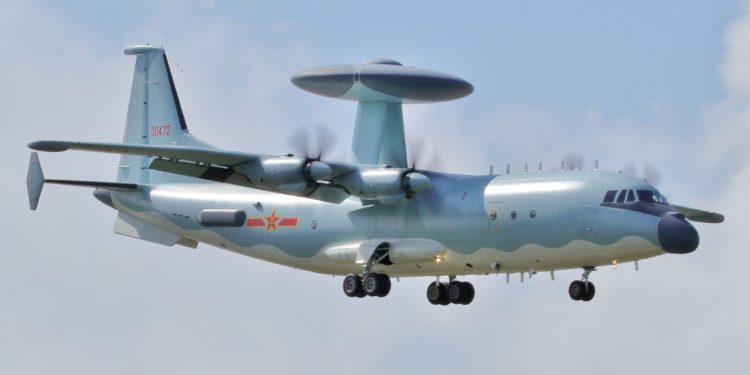A latest variation of China’s KJ-500 airborne early warning and control system (AWACS), equipped with a probe that can allow the plane to receive aerial refueling and greatly extend its range and endurance, was recently spotted at a naval aviation regiment base under the People’s Liberation Army (PLA) Southern Theater Command.
Amid frequent US military provocations, including close-up reconnaissance operations by spy planes in the South China Sea, the new KJ-500 allows the PLA to maintain extended early warning missions and enhance its capability to safeguard China’s territorial waters and airspace, analysts said on Monday.
The plane was identified in the background of a photo recently published by China Military Online, the English website of the Chinese military, Weihutang, a military program under China Central Television (CCTV), reported last weekend.
Unlike previous KJ-500s, an aerial refueling probe can be seen above the new aircraft’s nose, Weihutang said, noting that becoming capable of receiving aerial refueling will effectively solve problems, like the lack of sufficient range and endurance, which will significantly boost its combat capability.
The KJ-500 is equipped with early warning radar systems superior to those of the US, Fu Qianshao, a Chinese military aviation expert, told the Global Times on Monday.
But it is based on the Y-9 medium-sized tactical transport aircraft, which has a limited operational radius and endurance compared to large, strategic transport aircraft, Fu said, noting that aerial refueling can make up for this shortcoming.
The main missions of the PLA Southern Theater Command Navy are focused on the South China Sea. The US has been repeatedly and increasingly conducting provocative military operations in the region, including sending spy planes for close-up reconnaissance operations. Some of them even attempted to fake their identity, according to the South China Sea Strategic Situation Probing Initiative (SCSPI), a Beijing based think tank, on Thursday.
Fu said that the KJ-500 without aerial refueling capability can also operate in the South China Sea, but cannot conduct extended missions. Land-based radars in the South China Sea can be deployed only on larger islands and reefs, and cannot cover the entire region.
The new variation, combined with aerial tankers, can cover hundreds of kilometers, and command and control other friendly aircraft in the region, Fu said, noting that it will become a “capability amplifier” that enhances China’s monitoring over aerial and maritime targets in the South China Sea.
The Weihutang report pointed out that the plane spotted at the naval base was painted yellow instead of naval gray, which analysts said is usually a sign the new aircraft is still undergoing tests.
Fu said that the plane is expected to be in test service, as PLA troops likely have started training, and experimenting with its new capabilities.
In addition to the aerial refueling probe, the plane should have other upgrades that have not yet been revealed, Fu said.
China recently reached another milestone in AWACS development. Media reported last week that China’s first aircraft carrier-based, fixed-wing early warning aircraft, reportedly called the KJ-600, successfully made its maiden flight in late August.











